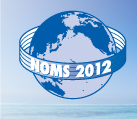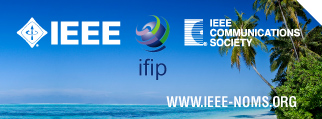| |
WORKSHOPS
MONDAY 16 APRIL 2012: 4th Workshop on Management of the Future Internet (ManFI)
The Fourth IEEE/IFIP International Workshop on Management of the Future Internet (ManFI 2012) will be held in conjunction with IEEE/IFIP NOMS 2012 in Maui, Hawaii, USA, from April 16-20, 2012. The workshop is sponsored by the IEEE Communications Society (ComSoc) and supported by POSTECH ITCE, Ghent University-IBBT, NEC, and Ericsson LM. To ack the organizations that the workshop co-chairs come from. The workshop is endorsed by the Technical Committee on Network Operations and Management (CNOM).
It is widely agreed that, despite its many successes, the current Internet also has a set of systemic problems, ranging from an upcoming shortage of IP addresses to insufficient security. However, the lack of scalable and agile manageability is arguably more important, as without management, it is impossible to build systems that adapt the services and resources offered in a context-dependent manner.
In either case (clean slate vs. evolution vs. revolution) we must consider the manageability of the Future Internet from the beginning. Following the success of the three previous editions of this workshop, held in conjunction with IM 2009, NOMS 2010 and IM 2011, ManFI 2012 aims at providing an international forum for researchers in these and similar areas. ManFI 2012 will combine original full paper presentations with a motivating keynote, quick hot topic presentations and a panel discussion to thoroughly explore this challenging topic.
More info
MONDAY 16 APRIL 2012: 1st Workshop on Algorithms and Operating Procedures for Federated Virtualized Networks (FEDNET)
Two major concepts have emerged recently for implementing the Future Internet or future networks: Network Virtualization (NV) and Network Federation (NF).
Network Virtualization enables the parallel operation (respectively consolidation) of multiple and possibly application specific network in a single physical system, and thus achieving vertical integration of network and services. Network Federation aims at the combination, also denoted as stitching, of willingly cooperating network resources and thus achieving horizontal convergence of diverse technical or administrative domains. Due to these features, NV and NF are currently investigated in almost all major FI projects such as GENI, AKARI, OneLab2 or G-Lab as the core technologies.
However, the operation of NV and NF based networks might become challenging. The support of multi-domain federated networks in virtual environments requires scalable management of network nodes and resources, which may exhibit a strong dynamic behavior. Future NV and NF based networks form constantly changing transport system in contrast to today’s rather static network. Furthermore, the users will not care about the whereabouts of services; currently they are viewed as parts of the virtualized and federated “cloud”, and it’s completely up to the operators to orchestrate the system behind the user interface such that good Quality of Experience is achieved.
Thus, new paradigms for network management of NV and NF are required. Here, a highly distributed ‘In-Network Management’ may be envisaged. To support this scalable management several challenges are in place. Some of these challenges include the discovery of the virtual resources in the federated environment, the support of different resources and how they can be stitched, which resources to be combined together, the bootstrap and federation of different virtual resources from different places, the negotiation of resources between providers, the maintenance of transparency of the network with multiple criteria and multiple operators, and of extremely importance is the performance measurement and models to evaluate federated networks. The integration of network and cloud resources for the support of federation of both networks and services will also be of major importance.
The aim of the first IEEE Workshop on Algorithms and Operating Procedures for Federated Virtualized Networks (FEDNET2012) is to bring together scientists and engineers from academia and industry and from various disciplines to exchange and discuss their ideas, views and research results towards the management and especially operation of consolidated, converged, virtualized and federated Future Internet and networks of the future.
More info
MONDAY 16 APRIL 2012: 5th Workshop on Distributed Autonomous Network Management System (DANMS)
The applicability of adaptive and autonomic techniques to network management is now generally accepted and is beginning to see widespread applicability in industrial applications. The autonomic process, as generally accepted, can be viewed as a loop (or a series of loops) with 4 broad tasks: monitoring, analysis, planning and execution (MAPE). While extensive progress has been made on providing support for monitoring of managed elements and the execution of management actions on managed elements, the analysis and planning phases are still largely in the research domain. Most network monitoring tools collect huge amounts of data, from which a small number of high-level metrics may be dashboarded, or serious faults highlighted. The rest is then archived for off-line analysis (if any). Most analysis and remedial planning is then performed by human managers supported by tools, while the execution of low-level management actions is handed off to network reconfiguration tools. This year DANMS will focus on the (semi-)automated analysis of monitoring data and the (semi-)automated planning of management strategies.
The growth of demand for user services is a key characteristic of modern and future ICT and telecommunications networks. New services have driven up network usage, but have also created huge network management problems for the operators, while end-users increasingly expect stream-lined and seamless network connectivity optimized for their services. Current approaches of monitoring and managing individual parts of telecommunications networks are still mostly agnostic to the diverse services using the network, or are optimized for voice services. Many management tools cannot even detect which services are operating on the network, much less support service-specific management objectives. Giving service providers access to the monitoring and management mechanisms of the network is not practical, given the multitude of heterogeneous networks involved, and the security, privacy, availability and regulatory oversight requirements inherent in managing a large network. Therefore it is the responsibility of the network managers to monitor and manage the services running over their networks based on the monitoring, analysis, planning and reconfiguration resources already available to them. Even though managing the network is already a challenge, additionally managing the services running over the networks is a key challenge that must be addressed in a timely manner. This year DANMS will particularly address how (semi-)automated analysis of network monitoring data, and planning of network management actions, can be applied to monitor, manage and support the services using the network.
The workshop aims to promote dissemination of new research results in the areas of service and network management in a distributed and autonomous fashion and encourage discussion and networking between researchers in this area, while exposing emerging challenges to the research community and to industrial players. Please visit the Call for Papers page for more details on the topics of interest.
More info
FRIDAY 20 APRIL 2012: 2nd Workshop on Managing federations and Cooperative management (ManFed)
THE ManFed WORKSHOP HAS BEEN CANCELLED.
There are a number of significant, common, complex issues which must be addressed in all technologies and applications that involve federated organisations – how to enable secure governance in the absence of a single, central point of authority; how to achieve semantic interoperability in the absence of common schema; how to provide effective access control in the absence of common user and role models; how to support effective decision making and provide the ability to deal with change in an environment that can be highly dynamic as well as highly heterogeneous; how to construct and maintain a common inter-domain governance model in the presence of highly diverse local governance infrastructures; how to manage multi-domain environments to realize the business goals of each consumer and provider.
This workshop will, continuing upon the success of the 1st ManFed Workshop held in Dublin in 2011, bring together researchers from a broad array of application and technical areas who are concerned with managing federations. It will draw out common themes, problems and issues that are encountered, and the solutions that have been devised to deal with the problems of managing information systems that cut across autonomous domains in the wide range of research fields and problem areas where such matters have been addressed. It will aim to provide the basis for a common understanding and common approaches to inter-domain management and governance that synthesises the insights and best of breed solutions being developed in the diverse areas in which these problems are encountered.
The contributed papers, after being reviewed and accepted by ManFed referees, will be published in the NOMS Workshop Proceedings that will be included in the IEEExplore. The papers from the previous Workshop have been also indexed and abstracted by several databases such as INSPEC, Engineering Index (EI), SCOPUS, Conference Proceedings Citation Index (CPCI), etc.
More info
FRIDAY 20 APRIL 2012: 3rd Workshop on Cloud Management (CloudMan)
Cloud computing and virtualization are currently hot topics and have been generating substantial interest in the community and it is anticipated that this interest will expand. It is also important to the management community as it is challenging traditional management methods by its sheer size and high level of automation. Clouds must provide appropriate levels of performance to large groups of diverse users, and those clouds are accessed through virtualized wide area networks. Management systems are essential for that and thereby for the future success of the cloud paradigm. New systems, methods, and approaches for cloud and virtualization management from an IT as well as a networking perspective are to be discussed at this workshop.
More info
FRIDAY 20 APRIL 2012: 7th Workshop on Business driven IT management (BDIM)
Information Technology (IT) management has evolved significantly over the past few years as IT-based solutions have become increasingly critical to the functioning of organizations. From device, network and systems management, solutions have evolved to include service management and IT governance, as witnessed by the recent popularity of ITIL and COBIT frameworks as well as the international standard ISO/IEC 20000.
A recent shift in perspective brought to bear a more customer-centric approach to IT management, putting IT managers in condition to look at IT not just from the IT department's traditional point of view, but from the customers’ and users’ points of view. Even more recently, a further shift towards holistic understanding of IT in order to fulfill business objectives is occurring: one now wishes to look beyond IT services to the context where the services are used. This is termed Business-driven IT Management (BDIM) and is the main subject of this Workshop.
BDIM focuses on the impact of IT on business processes and business-level objectives and vice versa; besides the conventional IT metrics such as availability and response time, it looks at other key performance indicators (KPIs), that is metrics that have significance from the point of view of the business supported by the IT. The BDIM approach aims at rethinking IT management from a business perspective. BDIM is not restricted to IT environments in enterprises, but encompasses techniques and decision making that involve thinking about IT in terms of objectives that are at business level, of organizations that may not traditionally be classified as "businesses".
More info
|
|
- PROGRAM
- Keynotes >>
- Technical sessions >>
- Application sessions >>
- Poster sessions >>
- Panels >>
- Distinguished Experts
Panel >>
- Mini conference >>
- Workshops >>
- Tutorials >>
- Dissertation Digest Sessions >>
- Student Demos >>
- GOLD >>
|
|





